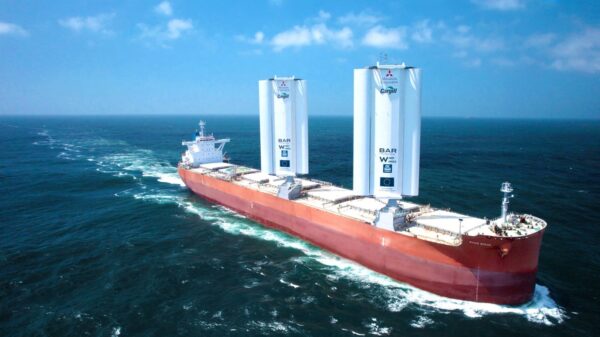The maritime industry – which accounts for nearly 3% of global CO2 emissions and is under pressure from investors and environmental groups to accelerate decarbonisation – is exploring a number of different technologies including ammonia and methanol in an effort to move away from dirtier bunker fuel.
In a step forward in the decarbonisation aims of the industry, a chartered dry bulk ship has launched on its first voyage since being fitted with special sails, aiming to study how harnessing wind power can cut emissions and energy usage in the shipping sector. Cargill, one of the world’s biggest ship charterers, has been exploring wind assisted propulsion as one cleaner energy option.
The five-year old Pyxis Ocean has been retrofitted with WindWings, large wing sails measuring up to 37.5 meters in height fitted to the deck of the cargo ship.
The launch of the ship comes amid a fractious debate between countries over how to decarbonise the international shipping industry, which carries up to 90 per cent of global trade but remains almost entirely dependent on fossil fuels. The industry faces growing pressure from regulators as well as customers such as Amazon, Unilever and Ikea, who have pledged to use only zero-emission ships by 2040. Shipping groups investing in decarbonisation, however, are divided on the best solutions. Companies are betting on a range of fuels including methanol and ammonia, as well as giant kites that can use wind to propel ships, despite concerns over whether alternative fuels will be affordable or available at scale.
Pyxis Ocean will sail from Singapore and head to Brazil and is likely to transport a cargo of grain to Denmark. The vessel is then likely to remain in the north Atlantic area to maximise wind usage.
You can read further coverage of the story in The Times [paywall], Telegraph [paywall], Financial Times, Reuters and Lloyds List.
You can view a video of the ship here.
